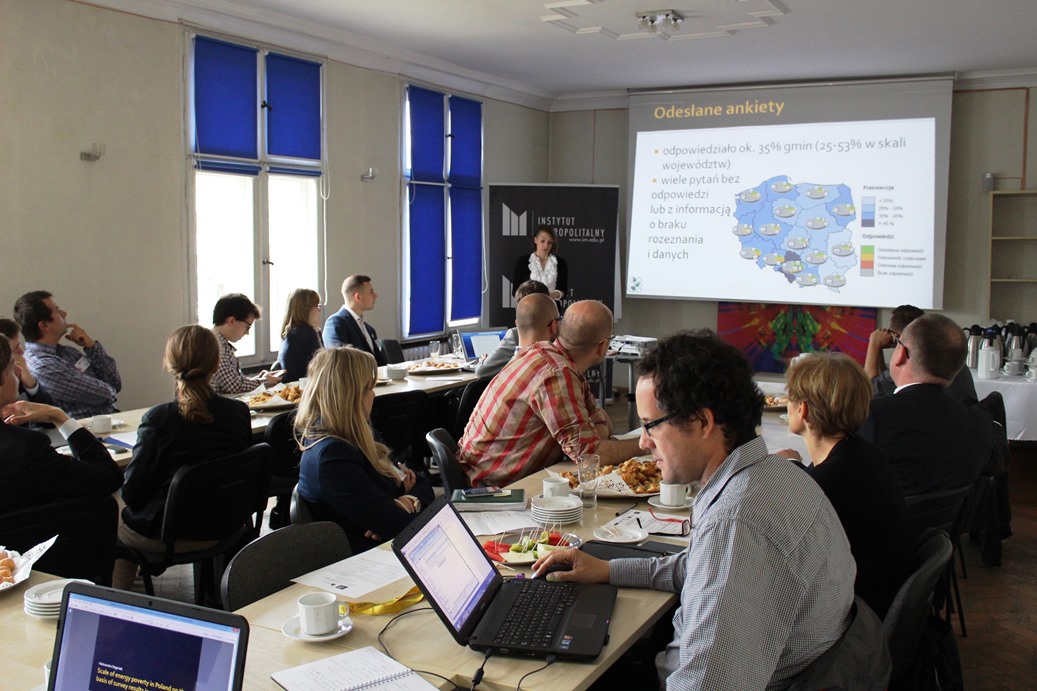Engaging Polish audience with EVALUATE research in Gdansk

On the 18th June 2015 Department of Economic Geography organised EVALUATE project workshop “Energy vulnerability of urban areas” in cooperation with Metropolitan Institute. The relation, co-authored with dr. Sergio Tirado-Herrero from University of Manchester, was published on the EVALUATE project blog.
The workshop took place at the Regional Information and Support Centre for NGOs in Gdansk and hosted 30 participants including the most important Polish think-thanks, academics, regional and local authorities with an interest in energy poverty issues, as well as local NGOs responsible for environmental protection. Its main aim was to present and discuss with Polish stakeholders the results of the 600 household survey conducted in case study districts Gdansk-Przymorze and Gdansk-Wrzeszcz in winter 2015.
After the welcome speech by Professor Iwona Sagan and Damian Zelewski on behalf of host institutions, Professor Stefan Bouzarovski (director of EVALUATE project) opened the first session by referring to the theoretical framework and the methodology of the EVALUATE project. The audience welcomed this introduction given that concepts such as energy vulnerability and energy poverty are often missing in academic and social discussions in Poland.
Then Jan Frankowski presented the initial results of the EVALUATE neighbourhood survey in Gdansk focusing on identified patterns of domestic energy use and expenditure, and on key energy vulnerability indicators. According to the data collected, the largest percentage of vulnerable households concentrates in Wrzeszcz – an old, inner city district with more differentiated heating sources, worse housing stock conditions and visible income inequalities. In Przymorze, a district built during socialism with large residential blocks and an older but relatively prosperous population, the situation is more comfortable.
Some of the results were surprising for the audience. For example, a representative of WWF Poland found it unexpected that surveyed households using electricity – the most expensive source of heat per unit of service – do not pay the highest bills. This is suspected to be caused by the small size of the sub-sample of households relying on this heating method, and by the popularity of coal as a fuel in the poorest income groups.
After these presentations and the coffee break, the second part of the event featured presentations by Dominik Owczarek from the Institute of Public Affairs (ISP), and Agata Miazga from the Institute for Structural Research (IBS). They discussed relative definitions of energy poverty inspired in the UK official low income-high costs (LIHC) indicator, and showed the most vulnerable groups in this area on the basis of Polish household budget survey. According to the results of IBS analysis, the the highest energy deprivation levels in Poland occur among residents of individual family houses, although the difference between energy vulnerable groups in terms of heating and electricity services is significant.
Aleksandra Stępniak (Institute for Sustainable Development), delivered the last presentation where awareness levels of energy poverty among Polish gminas (local communes or municipalities) were discussed. In the analysis Pomorskie – the region where the city of Gdansk is located – came up as the voivodeship with highest levels of of energy poverty recognition at the municipal level in Poland. However, Aleksandra warned against a very straightforward interpretation of these results because the term ‘energy poverty’ is still brand-new for Polish local authorities.
In the ensuing discussion, a representative of the Voivodeship Fund of Environmental Protection and Water Management – a key actor with capacity to leverage financial resources for public investments in Poland – explained to the participants the fund’s activities in areas relevant to the fight against energy poverty. In his final intervention, Stefan Bouzarovski, emphasized that energy poverty remains a problem directly dependent on political issues.
In the last part of the workshop, participants and speakers were asked to join breakout working groups that discussed effective institutional solutions for alleviating energy poverty in Poland. Most of participants agreed on the importance of NGOs and other environmental institutions to balance the role of ‘technical’ actors like the Ministry of Treasury.
- Presentation: “Energy Vulnerability and Urban Transitions in Europe (EValUaTE)” (Stefan Bouzarovski, Sergio Tirado-Herrero, Saska Petrova, Harriet Thomson, University of Manchester)
- Presentation: “Energy vulnerability of the urban areas in Gdansk. First results of the EVALUATE project.” (Jan Frankowski, Sergio Tirado-Herrero, University of Gdansk/University of Manchester)
- Presentation: “Who cannot afford on energy in Poland? Determinants of energy expenditures.” (Agata Miazga, Maciej Lis, Institute for Structural Research)
- Presentation: “Measuring energy poverty in Poland – a relative and an absolute definition” (Dominik Owczarek, Agata Miazga, Institute for Sustainable Development/Institute for Structural Research)
- Presentation: “Scale of energy poverty in Poland on the basis o survey results in gminas” (Aleksandra Stępniak, Institute for Sustainable Development)
The event was financed by European Research Council within the frames of EVALUATE research project.